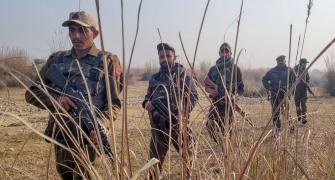Iran stood firm against mounting pressure from the United States on Monday for it to permit 'stricter' United Nations checks of its nuclear programme.
It accused the United States of 'blatant interference' after President George W Bush cheered six nights of pro-democracy student protests, which he said showed Iranians wanted freedom.
The UN atomic watchdog, European Union and Russia also urged Tehran to let inspectors make spot checks to see if its programme was purely for civilian use and not, as Washington says, a guise for developing nuclear bombs.
Tehran said it will only agree if it got access to long-banned Western nuclear know-how in return.
The US rejected the Iranian offer to consider ceding more authority to nuclear inspectors in return for access to nuclear technology.
"That's a nonstarter ... It's not a bargaining point. It's a point of living up to international standards that everybody else feels comfortable living up to," state department spokesman Richard Boucher told a daily briefing.
Attention shunted to Iran after Iraq's Saddam Hussein was toppled. Bush has branded Iran, Iraq and North Korea as an 'axis of evil', seeking unconventional weapons and helping terrorists.
Ignoring Iran's interference complaint, Richard Perle, a leading Pentagon adviser and architect of the Iraq invasion, said supporting protests might topple Iran's clerical government -- and that was the best way to remove any weapons threat.
"The best way to deal with the Iranian nuclear programme would be to liberate the Iranian people," he said.
The echoes of Iraq were clearly felt in Iran where some officials have said the protests, some of the most outspoken since the 1979 Islamic revolution, were organised from abroad.
"America is waging a psychological war against Iran," newspapers quoted Intelligence Minister Ali Yunesi as saying.
Tehran students have been protesting mainly against clerical leaders in the theocracy, and have clashed with hardliners. Those protests seemed to be calming but state media reported smaller demonstrations elsewhere, with one person killed.
Iran said it had sent an official protest to the United States over what it called blatant interference in its internal affairs through support for student protests.
Boucher said the US had not received a formal protest but was aware of Iranian complaints through the media.
"The United States stands with the students, with the demonstrators, with those in Iran who are asking for more rights, who are asking for freedoms, who are asking for a chance to join the modern world," Boucher added, echoing remarks by Bush on Sunday.
Meeting in Luxembourg, EU foreign ministers said Iran -- now sandwiched between US forces in Iraq and Afghanistan -- must accept tougher inspections if it wanted a planned trade deal, and expressed concern at the repression of the protests.
In a significant shift toward US thinking, the EU also said force might be necessary if diplomacy failed to address threats from nuclear, biological or chemical weapons, though it made no direct reference to Iran.
In Vienna, the UN's International Atomic Energy Agency (IAEA) board of governors discussed a harsh report by agency chief Mohammed ElBaradei in which he said Tehran had 'failed to report certain nuclear material and activities', but was making amends.
He urged Iran to sign an Additional Protocol to the nuclear Non-Proliferation Treaty with the IAEA, granting its monitors wider access and more intrusive, short-notice inspections.
"We're looking for the board to make clear its concern, to call on Iran to fix the problems, to call on Iran to sign the Additional Protocol and support the efforts of the IAEA to find out more information and get compliance," Boucher said.
Boucher said almost every country in the world had accepted the Additional Protocol and Iran should follow suit. In fact, out of 188 signatories to the nuclear Non-Proliferation Treaty, only 78 have approved the protocol and 32 have ratified it.
Iran's Atomic Energy Organisation said it might agree, but again demanded access to nuclear technology in exchange.
"We have not yet decided about signing the Additional Protocol, but we are studying it with a positive view," spokesman Khalil Mousavi told Reuters.
Vienna-based diplomats said Iran was offering 'nothing new' though one European diplomat in Iran said this could signify a slight softening of the country's position.








